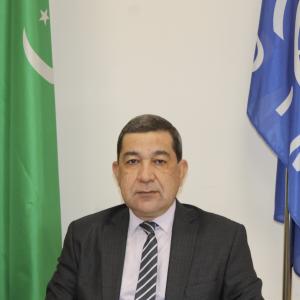Turkmenistan Launches New Five-Year National Action Plan on Combatting Trafficking in Persons
17 March 2025
Ashgabat, Turkmenistan – March 13, 2025 – The Ministry of Foreign Affairs of Turkmenistan hosted a briefing last Friday to present the new National Action Plan on Combatting Trafficking in Persons (CTIP NAP) for 2025–2029, which was developed with the support of the International Organization for Migration (IOM) and the United Nations Office on Drugs and Crime (UNODC) in Turkmenistan and endorsed by the presidential decree in January 2025.
The event was attended online and in-person by the representatives of the government entities comprising the Interdepartmental Commission on Combating Human Trafficking, senior leadership of IOM and UNODC, representatives of international organizations as well as diplomatic missions accredited in Turkmenistan. The new CTIP NAP was presented by the Prosecutor General of Turkmenistan who emphasized the importance of the coordinated effort to combat human trafficking and protect the most vulnerable populations, including migrants and victims of human trafficking.
Speaking at the briefing, the IOM Coordinator for Central Asia Mr. Serhan Aktoprak emphasized Turkmenistan’s commitment to preventing irregular migration and human trafficking. He praised Turkmenistan’s long-standing fruitful partnership with IOM, which has been instrumental in building up national expertise and capacities in identification, protection and rehabilitation of victims of human trafficking in line with Turkmenistan’s national human rights obligations and commitments under the Global Compact for Safe, Orderly, and Regular Migration. He noted that since 2005 IOM helped more than 550 Turkmen nationals who benefited from rehabilitation and return & reintegration assistance.
The new CTIP NAP on Combatting Trafficking in Persons is part of Turkmenistan's continued commitment to combating human trafficking and strengthening human rights protections. It is guided by a survivor-centered approach and inclusive of specific actions in response to emerging trends and challenges in combating human trafficking. In line with this approach, the new CTIP NAP provides for strengthening gender and age sensitive identification, repatriation, referral, rehabilitation and reintegration of victims of trafficking and their families; improvement of the National Referral Mechanism, taking into account the special needs of women and youth; strengthening the capacity of relevant national authorities to uphold the rights and compensate victims of trafficking; improving knowledge and capacity of front-line professionals and ensuring timely provision of rehabilitation services and reintegration support for victims of trafficking; enhancing provision of information and education and raising awareness among the population, including children and youth, about the dangers and consequences of trafficking, the rights of victims of trafficking and new forms of trafficking.
Mr. Chary Atayev, Head of the UNODC in Turkmenistan, discussed the organization's global leadership in the fight against transnational organized crime, including human trafficking. He highlighted UNODC's ongoing efforts to enhance Turkmenistan's institutional capacity in victim identification, referral, and the investigation of trafficking-related crimes. Atayev also acknowledged the key role of UNODC in supporting the development of Turkmenistan's new National Action Plan, which was initiated in 2023 through collaborative efforts involving various government agencies, civil society organizations, and international experts. He emphasized the importance of continued collaboration, particularly with the Ministry of Education and national authorities, to further strengthen the country's capacity to combat trafficking and protect the rights of victims.
The presentation concluded with the exchange of views on the practical implementation of the new CTIP NAP, highlighting the importance of collaboration between national stakeholders, international organizations and national NGOs to address human trafficking comprehensively.

Before joining UNDP, Timur was for more than 10 years in the Government service.
Timur holds Master of Arts degree in International Studies and Diplomacy from the Center for International Studies and Diplomacy of the School of Oriental and African Studies, University of London, and Bachelor’s degree in International Economic Relations from the Turkmen Institute of National Economy.




